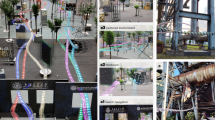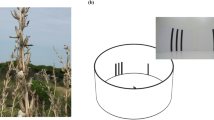Abstract
Perfect behaviours that are optimal to the environment an agent operates within rarely exist in real animals or in robotic systems. The costs (be they biological or economic) of building sensors and processing the information they capture become excessive compared to the small advantages that occur from the modifications of behaviour. Many self-organised systems are thought to change their properties as a result of changes in individual behaviour. Here, using both natural systems and computer simulations, we demonstrate that intertidal snail aggregations slightly decrease in size when individuals forage for shorter periods due to hotter and more desiccating conditions – a non-optimal behaviour for the snails since aggregation reduces desiccation stress. However, this decrease only occurs in simple experimental systems (and simulations of these systems). When studied in their more complex natural environment, and when simulated in such an environment, using the same information-processing behaviours, no difference in aggregation behaviour was found between hot and cool days. These results give an indication of the robustness of self-organised systems to changes in individual-level behaviour. They demonstrate that information processing capabilities of self-organised groups may not need to be as great as for agents that perform solitary tasks, and also that oversimplified tests of swarm intelligence may not give a true indication of how tasks may be performed in a more complex environment.
Similar content being viewed by others
Article PDF
Author information
Authors and Affiliations
Corresponding author
Rights and permissions
About this article
Cite this article
Stafford, R., Davies, M. & Williams, G. Robustness of self-organised systems to changes in individual level behaviour: an example from real and simulated self-organised snail aggregations. Nat Prec (2009). https://doi.org/10.1038/npre.2009.3922.1
Received:
Accepted:
Published:
DOI: https://doi.org/10.1038/npre.2009.3922.1



